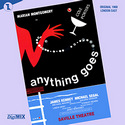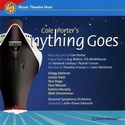|
Here are recordings of Cole Porter songs that have been part of Anything Goes (always or sometimes), brought back by JAY Records, available separately and together.
 ANYTHING GOES ANYTHING GOES
1969 LONDON REVIVAL CAST
(DigiMIX)
JAY Records
CD | Digital
It first appeared 89 years ago and Anything Goes goes on and on. Its original production predated the era when a hit Broadway show got more than a handful of its songs recorded with the original cast members and orchestrations, but later versions have resulted in souvenirs for our ears. In its ongoing noble mission to improve the sound quality of old recordings via the technology of its DigiMIX program, JAY Records has now retooled one of them, bringing new shine and warmth to the performances I'd known from my vinyl copy of the 1969 London cast album. (It was not released until 15 years later, and soon disappeared). This Anything Goes company features some idiosyncratic characterizations: performances with different tones that might strike you at first as a mix that doesn't mesh, but it's often entertaining in its bold choices.
As Reno Sweeney, Marian Montgomery's whiskey-tinged voice is not in the mold of its famously brassy originator, belter Ethel Merman. (If it seems a bad fit, be patient; it may grow on you.) She was better known as a sophisticated jazz singer, but we don't hear an overwhelming abundance of that sensibility here either. She meets the character more than half way, and her smoky, deep voice brings a different flavor to her tracks (she's on seven of them) whether sounding cheery or world-weary. Her diction is excellent, so Cole Porter's lyrics are crisply delivered even if his melodies sometimes feel more languid. Other numbers go for pep and punch, starting with the very hyperbolic overture with zippy orchestrations by music director Alfred Ralston that are the musical equivalent of gulping a triple espresso with a few teaspoons of sugar. It's frisky fun.
Janet Mahoney as Bonnie–a role expanded here–plays up the bubbliness, pouring on a glut of glee with squealing, squeaking and shrieking. James Kenney in the leading male role of Billy is game and glib, but seems more in his element with the lively numbers than in the romantic ballad "All Through the Night," shared with Valerie Verdon in the ingenue role. Michael Segal is amusing as the goofy gangster with advice to "Be Like the Bluebird" ("...and sing: tweet tweet, tra-la-la-la-la-la").
On this 17-track album, the cast takes on three of Porter's numbers with titles that start with the word "Let's" (none of which were part of the original score): "Let's Misbehave," "Let's Step Out," and "Let's Do It (Let's Fall in Love)." The borrowings followed the lead of the 1962 Off-Broadway production which included the first two and other interpolations also interspersed here (some showing up in later mountings, too): "It's De-Lovely," "Friendship," "Take Me Back to Manhattan," and "Heaven Hop." I'm glad for the retention of "Bon Voyage" and "Public Enemy Number One" that both feature strong choral work with panache.
If you purchase this retooled recording in the 2-CD set that also includes the 1995 studio cast version (described below), you'll have more of a case study of contrasts than clone, as the energies and orchestrations are quite different and the song lists are not identical. Cole Porter's songs are entertaining and flexible, and stand the test of time even though "times have changed and we've often rewound the clock" as the opening line of the title song of Anything Goes goes.
 ANYTHING GOES ANYTHING GOES
1995 STUDIO CAST
JAY Records (Reissue)
CD | Digital
Here is a solid studio cast recording of Anything Goes that was recorded six decades after the musical first came to Broadway, so the world had already had many chances to catch versions of it on stage, screen, TV, radio, and recordings. This 1995 treatment is an example of JAY Records' M.O. of attention to detail, with strong singers and the rich instrumental colors, as John Owen Edwards conducts the National Symphony Orchestra in generous-length renditions of classic scores. There are 19 tracks here, among which are a couple of less-often included Cole Porter treats and the bustling Entr'Acte that prominently features the stirring "Blow, Gabriel, Blow."
Three of the actor-singers heard here had already stepped into the same roles as replacements in revivals that employed the same Michael Gibson orchestrations enhancing this recording: Gregg Edelman as Billy with the Lincoln Center company (sounding more stalwart and earnest than others in the role); Louise Gold and Matt Zimmerman in London, as, respectively, entertainer Reno Sweeney and the wanted man posing as a preacher who joins her on the tongue-in-cheek promise of enduring "Friendship." This was in the late 1980s, a rich time for those seeking Anything Goes on disc, as both of those revivals were recorded with their original casts, an Australian cast album appeared, and there was the most song-stuffed studio cast release with bonus tracks. (The 1969 London production's recording, described above, wasn't issued until 1983, so it "counts" as one of five versions of the score that came to market in the same decade.) And, of course, the parade has continued with a few more revivals with recordings in the 21st century. The mind boggles; the ears are delighted.
If you like the lead female character's songs to be hearty and have heft, you're sure to like Louise Gold's trumpet-like belt. She isn't overwhelming us at full gale force all the time, but you won't be tempted to plead, "Sing out, Louise," to quote the role's originator, Ethel Merman, from another of her star roles. Miss Gold is a pistol as she pounces on the title song with abandon and a few growls thrown in, nailing the speediest section's rhythms with zingy instrumental sections between the choruses.
Among other pleasures are two spiffy, brisk numbers for chorus members that make me smile: "There Will Always Be a Lady Fair" for a male quartet and a bigger group on "There's No Cure Like Travel." For balance and respite from the fizzier and friskier doings, this recording makes room for some tender tunes not in the 1934 show's run. Gregg Edelman deftly sails through a swoon-worthy "Easy to Love," which wasn't at all easy for the original 1934 leading man to handle. So it was cut. It found a home in a movie a couple of years later, Born to Dance, which was supposed to have a song called "Goodbye, Little Dream, Goodbye" that got cut from it (and another score). It has landed in Anything Goes revivals, for ingenue Hope. Katrina Murphy does a nice job with this wistful ballad expressing disappointment in how things turn out for the character. But there's not much reason for disappointment in this bounty of songs that have at one time or another been part of Anything Goes.
|
|